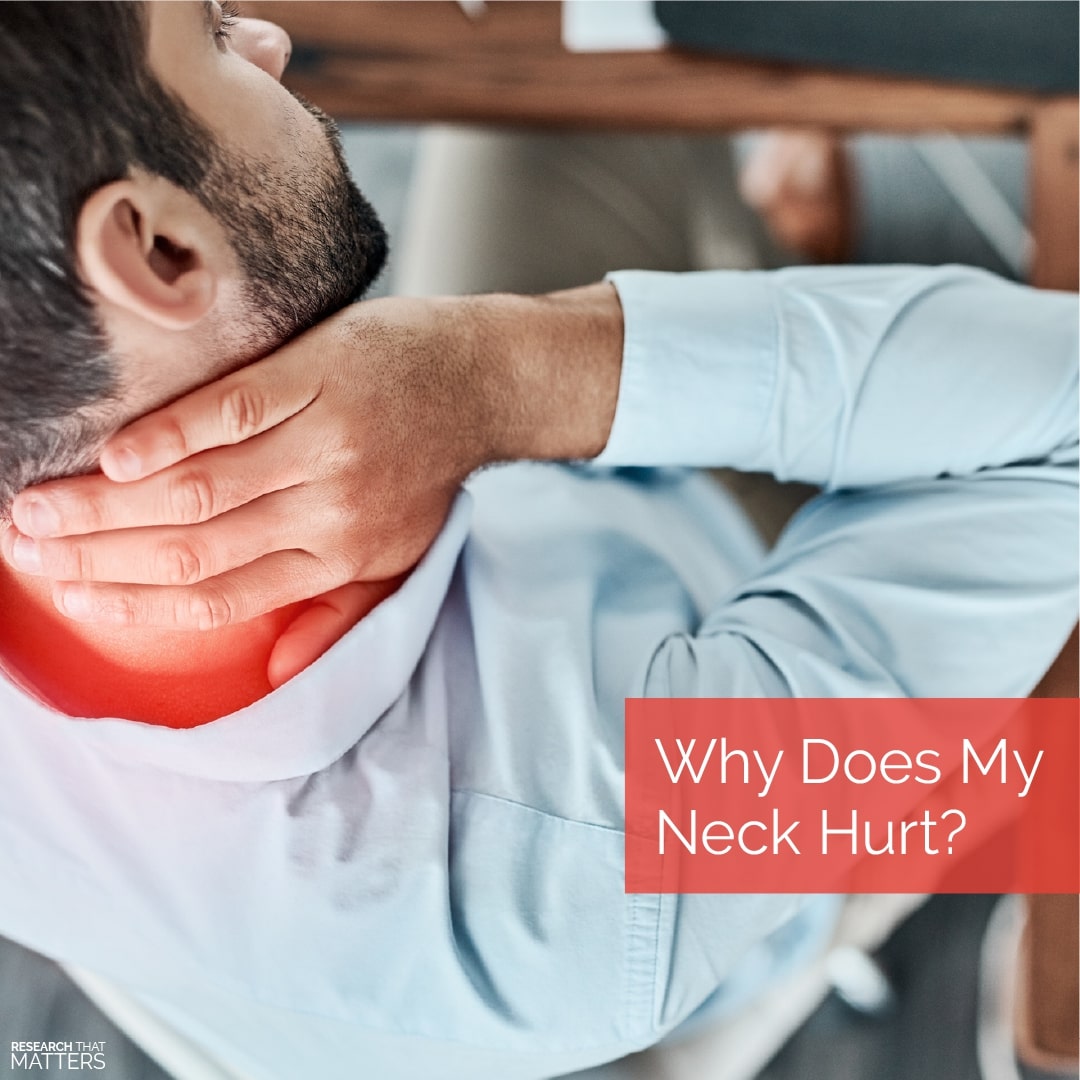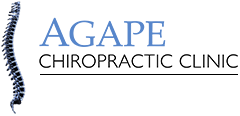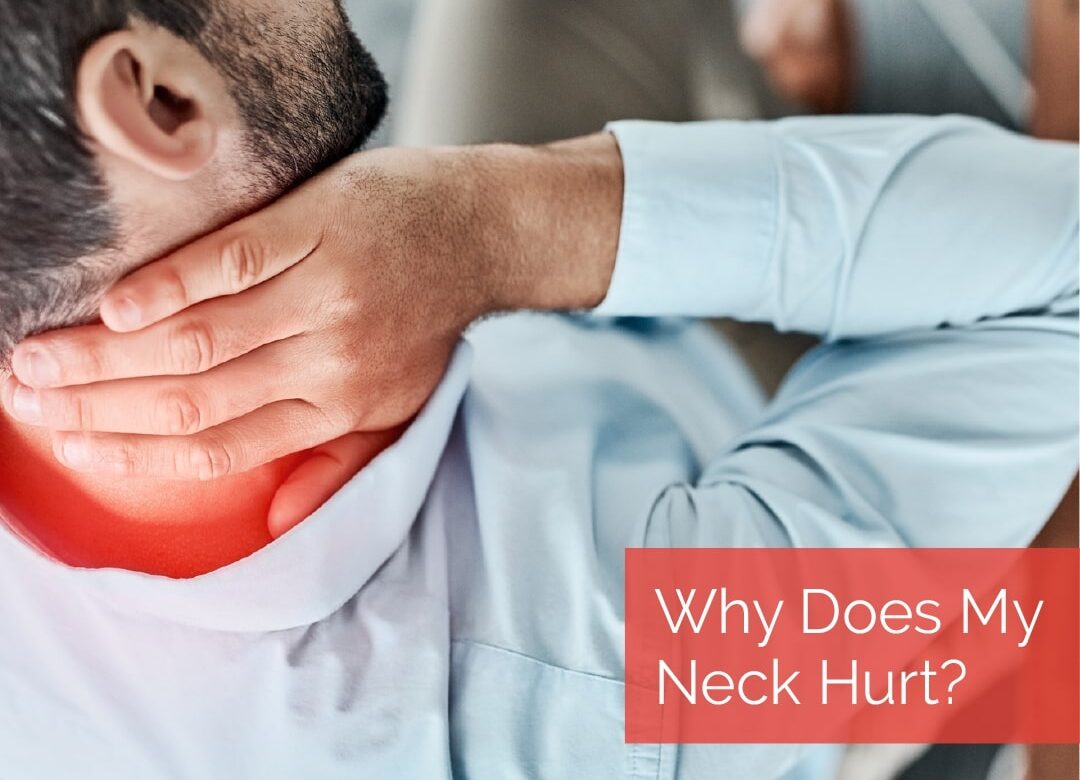section-02280fe
Why Does My Neck Hurt?
 Bottom Line:Your neck has a tough job.
Bottom Line:Your neck has a tough job.
It has to hold, stabilize, and move the weight of your head… every day… for a lifetime.
Holding up 11 pounds may not seem like a lot, but the 7 bones and 20 muscles of your neck have to work together in perfect harmony to balance that weight so you to move your head around free of pain.
Postural changes, sudden injuries, and arthritis are just a few of the primary causes of neck pain, and that pain can often be traced to a problem with either the muscles, bones, discs, or nerves in your neck.
Why it Matters:
If you’ve ever wondered “why does my neck hurt” and been unable to turn your head for a day or two, you know how life-changing neck pain can be.
The sharp muscle spasms that restrict your ability to move often happen when your body is trying to protect a spinal joint that isn’t moving correctly.
Almost every bone in your neck has a pair of sliding joints towards the back called facet joints. If those joints become “stuck,” your body will try to compensate, but, over time, that compensation can cause a cascade of additional challenges.
Here’s what you need to know:
- Sudden injuries, arthritis, and postural issues can all contribute to neck pain.
- The small sliding joints of the neck can become “stuck,” leading to muscles spasms and pain.
- Gentle spinal adjustments combined with daily stretching can help restore proper motion in the joints of the neck and reduce pain.
Next Steps:
Pain in your neck is your body’s way of saying “pain attention”!
Even if your neck pain often eases up by the end of the day, it’s a smart idea to have our team evaluate how it’s moving.
Movement assessments provide us with an incredible amount of information about your body.
By taking a proactive approach to your health today, you may be able to prevent future episodes of neck pain and stiffness.
It all starts with a call. Our doors are open, and we’re here to help!
Science Source(s):
Stenosis: How a Pinch in Your Neck Can Affect Your Whole Body
 Bottom Line:Have you been told that you have spinal stenosis?
Bottom Line:Have you been told that you have spinal stenosis?
If so, you're not alone.
Millions of people suffer from spinal stenosis each day, and it's the number one reason people over 65 years old have spine surgery.
Spinal stenosis describes the compression, or pinching, of your spinal cord, and it can occur due to a disc herniation, bone spur, or ligament overgrowth.
The good news? Drugs and surgery are not the only way to find relief from stenosis in the neck.
Why it Matters:
For many, the most significant challenge associated with spinal stenosis is the decreased ability to get up and move.
Severe pinching in your neck can cause issues with your arms and legs.
One of the best ways to relieve the symptoms associated with spinal stenosis is to open up the spinal canal and take the pressure off the nerves and spinal cord.
Many chiropractic techniques focus on decreasing the pressure on your spinal cord, which can help to relieve the symptoms associated with spinal stenosis.
To recap:
• Spinal stenosis is a narrowing of the spaces within your spine, which can put pressure on the nerves that travel through it.
• Spinal stenosis is most commonly caused by degenerative changes in the spine related to osteoarthritis.
• Relief can often be found through a combination of building strength in the muscles supporting the spine and improving the flexibility and stability of the spine with chiropractic care.
Next Steps:
After beginning chiropractic care, many patients report an improvement in their overall quality of life.
They notice a decrease in their symptoms and the ability to walk further without pain.
If you have been slowed down by spinal stenosis, don't hesitate to schedule an evaluation with us.
Our expert team is here to guide you towards the best treatment options so you can find relief.
Just give us a call to get started!
Science Source(s):
Spinal Stenosis. The Mayo Clinic. 2020.
Is My Arm Pain Coming from My Neck?
 Bottom Line:Pain in your hand, wrist, or arm can be frustrating.
Bottom Line:Pain in your hand, wrist, or arm can be frustrating.
You don't realize how much you use your arms and hands until pain, numbness, or tingling gets in the way.
Most of us don't usually wonder "is my arm pain coming from my neck" right off the bat, but it's actually very common for arm pain to be traced back to a nerve issue in the neck.
Why it Matters:
We've seen time and time again how hand, wrist, and arm pain often start with a neck problem.
For example, when a spinal disc in your neck irritates or presses on a nerve, it can result in arm pain.
Just like the power lines that bring electricity to your house, your brain and spinal cord split into individual nerve roots that deliver information to every part of your body.
And it just so happens that the nerves in your neck are specifically focused on providing strength and sensation to your head and arms.
Here’s what you should know:
• A bulged or herniated disc in your neck can irritate or compress the nerves that travel to your hands, arms, and shoulders.
• Improving spinal mobility, decreasing inflammation, and improving your posture may help prevent future episodes of neck and arm pain.
• Over 86% of people who received chiropractic adjustments for the care of neck disc herniation showed improvement.
Next Steps:
Pain in the arm as a result of a pinched nerve in your neck very rarely requires surgery.
Most people can find long-term relief with conservative options like the chiropractic care we provide in our practice.
Adjustments are just one of the non-invasive tools we use to help reduce the irritation and inflammation in your neck so your body has time to heal.
If you've been living with those nagging pains in your arms or neck day after day, give us a call.
Together, we'll get to the root cause and design a complete plan to help you curb those symptoms and get your life back.
Science Source(s):
Cervical Nerve Root Injections or Spinal Manipulative Therapy. JMPT. 2016.
Neck Pain: How to Find Relief
 Bottom Line:An episode of neck pain can quickly hamper your everyday activities.
Bottom Line:An episode of neck pain can quickly hamper your everyday activities.
Whether you began experiencing pain due to injury, degenerative spinal changes, or poor posture, it can be difficult to think about anything except the pain.
It's estimated that 70% of people experience neck pain in their life, but you should know there is a path towards neck pain relief.
Why it Matters:
Neck pain can encompass anything from headaches to pain in your arms and hands to an actual pain in your neck.
That's because different types of pain indicate different issues.
The most common reasons for neck pain are strained muscles and "stuck" spinal joints.
Whatever the underlying issue, the one thing they have in common is that they can cause a lot of pain and may have you fearing that you have a more significant issue.
Know that with a proper examination, our team can pinpoint the root cause of your pain specifically.
Did you know:
• The facet joints are the small spinal joints located at the back of your spine that often become fixated or "stuck" which can lead to pain.
• Muscle strains can occur as a result of poor posture or even sleeping in an awkward position.
• Whatever the cause, proper motion can help to reduce irritation and inflammation and restore your range of motion.
Next Steps:
A small adjustment today (literally!) can make big changes in your quality of life.
Our expertly trained team is focused on helping you feel and function better, and that often starts with improving your spinal motion.
We also make sure to provide you with the stretches and exercises we know are essential so you to continue your improvement from the comfort of your own home.
So, if neck pain is getting in the way of you enjoying your life, give us a call.
Our doors are open, and we're here to help!
Science Source(s):
Spinal Manipulation, Medication, or Exercise. Annals of Internal Medicine. 2012.
The Truth About Chiropractic
 Bottom Line:Chiropractors have been helping people perform their best for over 125 years.
Bottom Line:Chiropractors have been helping people perform their best for over 125 years.
Many things have changed since the beginning, but the one thing that remains constant is our commitment to helping people find relief from pain and improve their quality of life without drugs or surgery.
Your body's ability to heal is truly incredible, and at the center of this healing ability is a strong connection between your brain and body.
Why it Matters:
Your brain and body are connected by a perfectly complex system of nerves that control and coordinate everything that happens in your life.
Physical, mental, and chemical stressors can all wreak havoc on your body's ability to process information.
Such disruptions can lead to pain, decreased functional abilities, and, in some cases, even chronic disease.
Did you know:
• Wellness is the act of practicing daily healthy habits, not merely the absence of pain.
• Lifestyle factors drive about 80% of chronic diseases.
• Chiropractors have been trained to identify the lifestyle factors that may lead to health challenges and to help you address them proactively.
Next Steps:
You may think of chiropractors as the doctors who just adjust your back, but the truth is that chiropractic care can offer you much more!
Working with your chiropractor to find opportunities to be more proactive with your health will lead to better results, a higher quality of life, and a more positive approach to living.
If you believe in the body's incredible healing ability like we do, it's time to get adjusted in more ways than one.
Give us a call today!
Science Source(s):
5 Healthy Habits That Prevent Chronic Disease. Cleveland Clinic. 2020.









